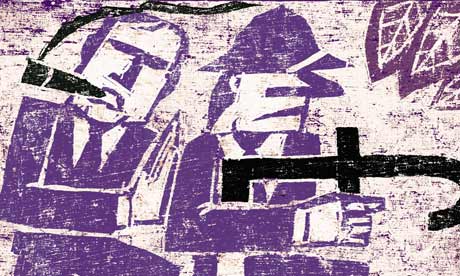
Illustration by Daniel Pudles
A One-Sided Justice Sees Weaker States Punished As Rich Nations and Giant Corporations Project Their Power Across The World
By George Monbiot
Monday 30 April 2012 15.30 EDT
Courtesy Of "The Guardian"
The conviction of Charles Taylor, the former president of Liberia, is said to have sent an unequivocal message to current leaders: that great office confers no immunity. In fact it sent two messages: if you run a small, weak nation, you may be subject to the full force of international law; if you run a powerful nation, you have nothing to fear.
While anyone with an interest in human rights should welcome the verdict, it reminds us that no one has faced legal consequences for launching the illegal war against Iraq. This fits the Nuremberg tribunal's definition of a "crime of aggression", which it called "the supreme international crime". The charges on which, in an impartial system, George Bush, Tony Blair and their associates should have been investigated are far graver than those for which Taylor was found guilty.
The foreign secretary, William Hague, claims that Taylor's conviction "demonstrates that those who have committed the most serious of crimes can and will be held to account for their actions". But the international criminal court, though it was established 10 years ago, and though the crime of aggression has been recognised in international law since 1945, still has no jurisdiction over "the most serious of crimes". This is because the powerful nations, for obvious reasons, are procrastinating. Nor have the United Kingdom, the United States and other western nations incorporated the crime of aggression into their own legislation. International law remains an imperial project, in which only the crimes committed by vassal states are punished.
In this respect it corresponds to other global powers. Despite its trumpeted reforms, the International Monetary Fund remains under the control of the United States and the former colonial powers. All constitutional matters still require an 85% share of the vote. By an inexplicable oversight, the United States retains 16.7%, ensuring that it possesses a veto over subsequent reforms. Belgium still has eight times the votes of Bangladesh, Italy a bigger share than India, and the United Kingdom and France between them more voting power than the 49 African members. The managing director remains, as imperial tradition insists, a European, her deputy an American.
The IMF, as a result, is still the means by which western financial markets project their power into the rest of the world. At the end of last year, for example, it published a paper pressing emerging economies to increase their "financial depth", which it defines as "the total financial claims and counterclaims of an economy". This, it claimed, would insulate them from crisis. As the Bretton Woods Project points out, emerging nations with large real economies and small financial sectors were the countries which best weathered the economic crisis, which was caused by advanced economies with large financial sectors. Like the modern opium wars it waged in the 1980s and 1990s – when it forced Asian countries to liberalise their currencies, permitting western financial speculators to attack them – the IMF's prescriptions are incomprehensible until they are understood as instruments of financial power.
Decolonisation did not take place until the former colonial powers and the empires of capital on whose behalf they operated had established other means of retaining control. Some, like the IMF and World Bank, have remained almost unchanged. Others, like the programme of extraordinary rendition, evolved in response to new challenges to global hegemony.
As the kidnapping of Abdul Hakim Belhaj and his wife suggests, the UK's foreign and intelligence services see themselves as a global police force, minding the affairs of other nations. In 2004, after Tony Blair, with one eye on possible contracts for British oil companies, decided that Gaddafi was a useful asset, the alliance was sealed with the capture, packaging and delivery of the regime's dissenters.
Like the colonial crimes the British government committed in Kenya and elsewhere, whose concealment was sustained by the Foreign Office until its secret archives were revealed last month, the rendition programme was hidden from public view. Just as the colonial secretary, Alan Lennox-Boyd, repeatedly lied to parliament about the detention and torture of Kikuyu people, in 2005 Jack Straw, then foreign secretary, told parliament that "there simply is no truth in the claims that the United Kingdom has been involved in rendition".
Reading the emails passed between the offices of James Murdoch and Jeremy Hunt, it struck me that here too is a government which sees itself as an agent of empire – Murdoch's in this case – and which sees the electorate as ornamental. Working, against the public interest, for News Corporation, the financial sector and the billionaire donors to the Conservative party, its ministers act as capital's district commissioners, governing Britain as their forebears governed the colonies.
The bid for power, oil and spheres of influence that Bush and Blair launched in Mesopotamia, using the traditional camouflage of the civilising mission; the colonial war still being fought in Afghanistan, 199 years after the Great Game began; the global policing functions the great powers have arrogated to themselves; the one-sided justice dispensed by international law. All these suggest that imperialism never ended, but merely mutated into new forms. The virtual empire knows no boundaries. Until we begin to recognise and confront it, all of us, black and white, will remain its subjects.
• A fully referenced version of this article can be found atwww.monbiot.com




No comments:
Post a Comment